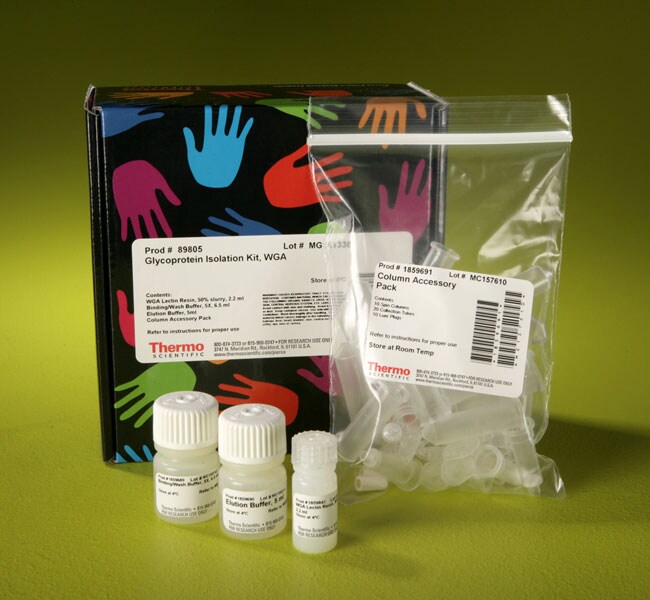Search Thermo Fisher Scientific

Certificates
SDS
Citations & References (3)
Thermo Scientific™
Pierce™ Glycoprotein Isolation Kit, WGA
The Thermo Scientific Pierce Glycoprotein Isolation Kit (Wheat Germ Agglutinin) allows isolation of glycoproteins from complex mixtures, including serum, tissueRead more
| Catalog Number | Quantity |
|---|---|
| 89805 | 10 reactions kit |
Catalog number 89805
Price (USD)
528.00
Each
In stock
Quantity:
10 reactions kit
Price (USD)
528.00
Each
The Thermo Scientific Pierce Glycoprotein Isolation Kit (Wheat Germ Agglutinin) allows isolation of glycoproteins from complex mixtures, including serum, tissue and cultured cell lysates. The procedure uses wheat germ agglutinin (WGA) as a ligand to bind a specific class of glycoprotein from complex protein samples—those containing N-Acetyl glucosamine (GlcNAc) groups or sialic acid. This kit has been used to isolate glycoproteins from serum as well as HeLa and CHO cell lysates in approximately 50 minutes.
Features of this Glycoprotein Isolation Kit:
• High recovery—equivalent or greater glycoprotein recovery versus competitor kits and lectin resins
• Fast—glycoprotein purification in less than an hour
• Versatile—isolate glycoproteins from various sample types, e.g., human serum and cell lysate.
• Robust—lectin does not leach from resin when processing sample
• Convenient—complete kit offering lectin resins and spin columns with all necessary reagents
• Compatible with Bradford-based protein assays—dialysis or protein precipitation of recovered glycoproteins is not required prior to protein assay
Related Products
Pierce™ Glycoprotein Isolation Kit, ConA
Features of this Glycoprotein Isolation Kit:
• High recovery—equivalent or greater glycoprotein recovery versus competitor kits and lectin resins
• Fast—glycoprotein purification in less than an hour
• Versatile—isolate glycoproteins from various sample types, e.g., human serum and cell lysate.
• Robust—lectin does not leach from resin when processing sample
• Convenient—complete kit offering lectin resins and spin columns with all necessary reagents
• Compatible with Bradford-based protein assays—dialysis or protein precipitation of recovered glycoproteins is not required prior to protein assay
Related Products
Pierce™ Glycoprotein Isolation Kit, ConA
For Research Use Only. Not for use in diagnostic procedures.
Specifications
Column TypeAffinity, Agarose Resin
DescriptionPierce Glycoprotein Isolation Kit, WGA
FormatKit, Microcentrifuge, Spin Column
Quantity10 reactions kit
Stationary PhaseLectin
Sufficient For10 Reactions
TargetGlycoprotein
Product LinePierce™
TypeGlycoprotein Isolation Kit
Unit SizeEach
Contents & Storage
Sufficient For: Isolating glycoproteins with strong affinity for WGA from 10 samples of up to 640 μL (1 to 1.5 mg total protein) each
• WGA Lectin Resin, 1.1 mL
• Binding/Wash Buffer (5X), 6.5 mL
• Elution Buffer, 5 mL
• Spin Columns, 10 columns
• Collection Tubes, 20 tubes
Store at 4°C.
• WGA Lectin Resin, 1.1 mL
• Binding/Wash Buffer (5X), 6.5 mL
• Elution Buffer, 5 mL
• Spin Columns, 10 columns
• Collection Tubes, 20 tubes
Store at 4°C.
Have questions about this product? Ask our AI assisted search.
This is an AI-powered search and may not always get things right. You can help us make it better with a thumbs up or down on individual answers or by selecting the “Give feedback" button. Your search history and customer login information may be retained by Thermo Fisher and processed in accordance with our
Privacy Notice.
Frequently asked questions (FAQs)
Figures

Glycoprotein Isolation Kit Protocol

Glycoprotein isolation from human serum and cell lysate – performance comparison of kits using WGA resin
Customers who viewed this item also viewed
Documents & Downloads
Certificates
Search by lot number or partial lot number
Lot #Certificate TypeDateCatalog Number(s)
3215382Certificate of AnalysisJun 25, 202589805
AA411292Certificate of AnalysisJan 31, 202589805
ZL399016Certificate of AnalysisJan 31, 202589805
ZH387714Certificate of AnalysisAug 16, 202489805
ZD390815Certificate of AnalysisApr 24, 202489805
5 results displayed, search above for a specific certificate
Safety Data Sheets
SDS
Product Information
Citations & References (3)
Search citations by name, author, journal title or abstract text
Citations & References
Abstract
Lectin affinity as an approach to the proteomic analysis of membrane glycoproteins.
Journal:J Proteome Res
PubMed ID:15359739
The aim was to determine the proportion of membrane glycoproteins captured using concanavalin A or wheat germ agglutinin lectin affinity chromatography. Digests of the isolated proteins were separated by reversed-phase liquid chromatography and analyzed by matrix-assisted laser desorption tandem mass spectrometry. The two lectins identified different groups of proteins with
Identification of Potential Glycoprotein Biomarkers in Estrogen Receptor Positive (ER+) and Negative (ER-) Human Breast Cancer Tissues by LC-LTQ/FT-ICR Mass Spectrometry.
Journal:J Cancer
PubMed ID:22773931
Breast cancer is the second most fatal cancer in American women. To increase the life expectancy of patients with breast cancer new diagnostic and prognostic biomarkers and drug targets must be identified. A change in the glycosylation on a glycoprotein often causes a change in the function of that glycoprotein;
GlycoSuiteDB: a new curated relational database of glycoprotein glycan structures and their biological sources.
Journal:Nucleic Acids Res
PubMed ID:11125129
GlycoSuiteDB is a relational database that curates information from the scientific literature on glyco-protein derived glycan structures, their biological sources, the references in which the glycan was described and the methods used to determine the glycan structure. To date, the database includes most published O:-linked oligosaccharides from the last 50
3 total citations